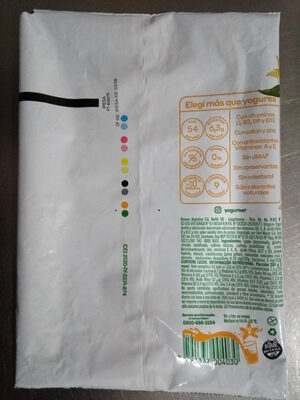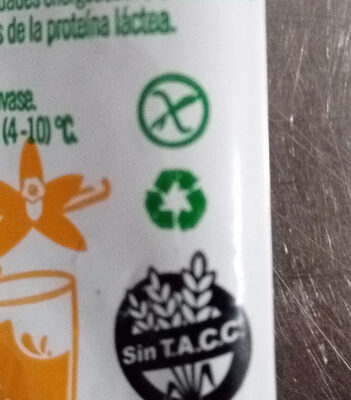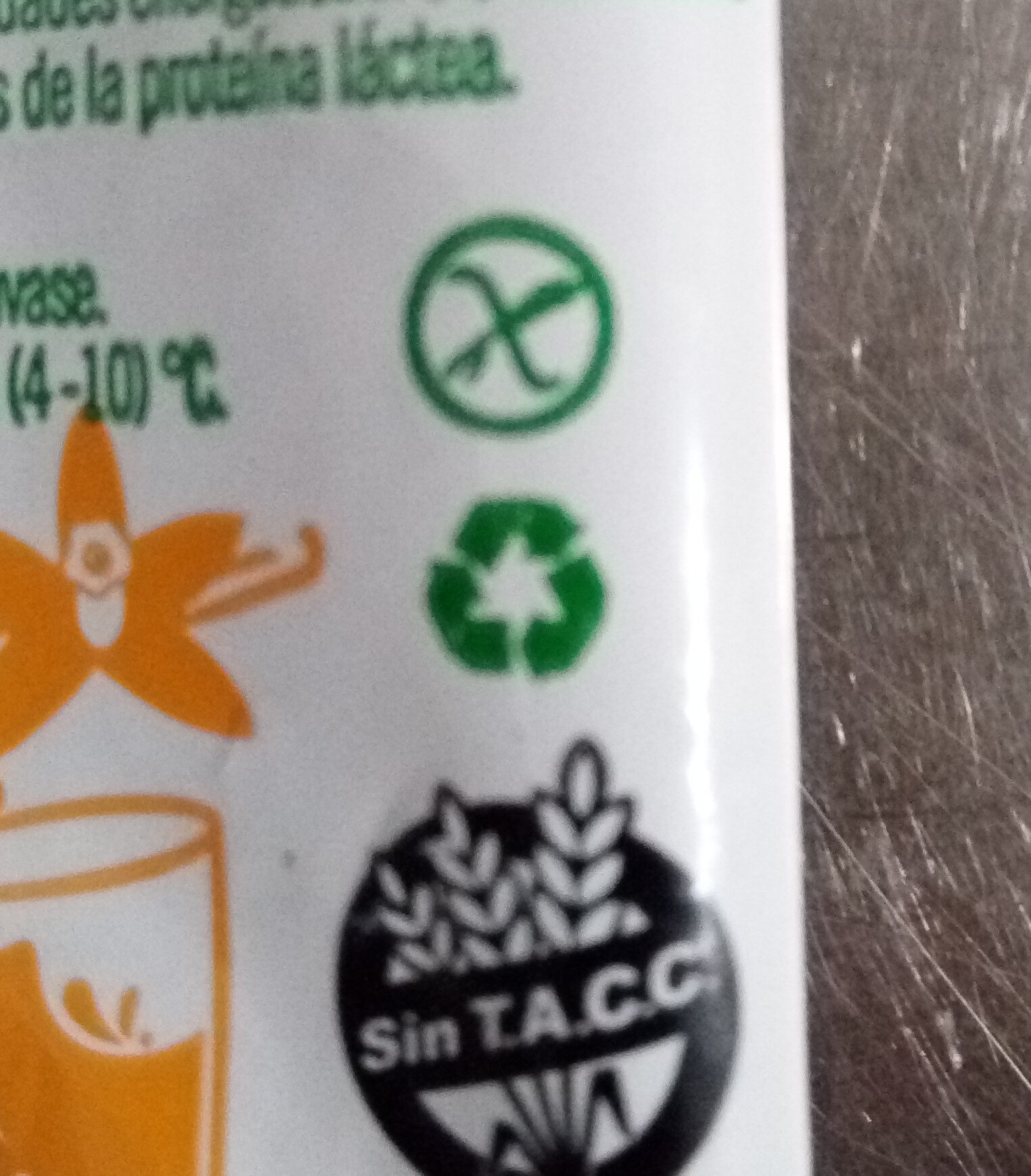Help us make food transparency the norm!
As a non-profit organization, we depend on your donations to continue informing consumers around the world about what they eat.
The food revolution starts with you!
Yogur Ser sabor vainilla - 1 kg
Yogur Ser sabor vainilla - 1 kg
Barcode: 7791337004030 (EAN / EAN-13)
Common name: Yogur con probióticos dietético descremado fortificado con zinc y vitaminas A, B3, B12, D, E y ácido fólico sabor vainilla libre de gluten. Sin tacc.
Quantity: 1 kg
Categories: Beverages, Dairies, Fermented foods, Fermented milk products, Desserts, Dairy desserts, Dairy drinks, Fermented dairy desserts, Fermented drinks, Yogurts, Fermented milk drinks, Vanilla yogurt, Drinkable yogurts
Labels, certifications, awards:
No gluten, No preservatives, Enriched with calcium, No added sugar, No artificial colors, No cholesterol, es:Sin TACC, Enriched-wih-vitamins
Origin of ingredients: Argentina
Manufacturing or processing places: Argentina
Link to the product page on the official site of the producer: http://www.yogurser.com
Stores: Dia
Countries where sold: Argentina
Matching with your preferences
Health
Ingredients
-
24 ingredients
: Leche descremada, gelatina, almidón modificado, cultivos lácticos, cultivos probióticos (L. casei, Bifidobacterium), zinc, vitaminas E, A, D, ácido fólico, B12 y B3, aromas (vainilla, melaza), estabilizantes (goma gellan), colorantes naturales, edulcorantes (Acesulfame K; Sucralosa). CONTIENE LECHE.Allergens: Milk
Food processing
-
Ultra processed foods
Elements that indicate the product is in the 4 - Ultra processed food and drink products group:
- Additive: E14XX - Modified Starch
- Additive: E418 - Gellan gum
- Additive: E428 - Gelatine
- Additive: E950 - Acesulfame k
- Additive: E955 - Sucralose
- Ingredient: Colour
- Ingredient: Flavouring
- Ingredient: Sweetener
Food products are classified into 4 groups according to their degree of processing:
- Unprocessed or minimally processed foods
- Processed culinary ingredients
- Processed foods
- Ultra processed foods
The determination of the group is based on the category of the product and on the ingredients it contains.
Additives
-
E418 - Gellan gum
Gellan gum: Gellan gum is a water-soluble anionic polysaccharide produced by the bacterium Sphingomonas elodea -formerly Pseudomonas elodea based on the taxonomic classification at the time of its discovery-. Its taxonomic classification has been subsequently changed to Sphingomonas elodea based on current classification system. The gellan-producing bacterium was discovered and isolated by the former Kelco Division of Merck & Company, Inc. in 1978 from the lily plant tissue from a natural pond in Pennsylvania, USA. It was initially identified as a substitute gelling agent at significantly lower use level to replace agar in solid culture media for the growth of various microorganisms Its initial commercial product with the trademark as "GELRITE" gellan gum, was subsequently identified as a suitable agar substitute as gelling agent in various clinical bacteriological media.Source: Wikipedia
-
E950 - Acesulfame k
Acesulfame potassium: Acesulfame potassium - AY-see-SUL-faym-, also known as acesulfame K -K is the symbol for potassium- or Ace K, is a calorie-free sugar substitute -artificial sweetener- often marketed under the trade names Sunett and Sweet One. In the European Union, it is known under the E number -additive code- E950. It was discovered accidentally in 1967 by German chemist Karl Clauss at Hoechst AG -now Nutrinova-. In chemical structure, acesulfame potassium is the potassium salt of 6-methyl-1‚2,3-oxathiazine-4-3H--one 2‚2-dioxide. It is a white crystalline powder with molecular formula C4H4KNO4S and a molecular weight of 201.24 g/mol.Source: Wikipedia
-
E955 - Sucralose
Sucralose: Sucralose is an artificial sweetener and sugar substitute. The majority of ingested sucralose is not broken down by the body, so it is noncaloric. In the European Union, it is also known under the E number E955. It is produced by chlorination of sucrose. Sucralose is about 320 to 1‚000 times sweeter than sucrose, three times as sweet as both aspartame and acesulfame potassium, and twice as sweet as sodium saccharin. Evidence of benefit is lacking for long-term weight loss with some data supporting weight gain and heart disease risks.It is stable under heat and over a broad range of pH conditions. Therefore, it can be used in baking or in products that require a long shelf life. The commercial success of sucralose-based products stems from its favorable comparison to other low-calorie sweeteners in terms of taste, stability, and safety. Common brand names of sucralose-based sweeteners are Splenda, Zerocal, Sukrana, SucraPlus, Candys, Cukren, and Nevella. Canderel Yellow also contains sucralose, but the original Canderel and Green Canderel do not.Source: Wikipedia
Ingredients analysis
-
Palm oil free
No ingredients containing palm oil detected
-
Non-vegan
Non-vegan ingredients: Skimmed milk, E428
-
Non-vegetarian
Non-vegetarian ingredients: E428
-
Details of the analysis of the ingredients
: Leche descremada, gelatina, almidón modificado, cultivos lácticos, cultivos probióticos (lactobacillus casei, Bifidobacterium), zinc, vitaminas, vitamina E, vitamina A, vitamina D, ácido fólico, vitamina B12, vitamina B3, aromas (vainilla, melaza), estabilizantes (goma gellan), colorantes naturales, edulcorantes (Acesulfame K, Sucralosa)- Leche descremada -> en:skimmed-milk - vegan: no - vegetarian: yes - ciqual_proxy_food_code: 19051 - percent_min: 5.88235294117647 - percent_max: 100
- gelatina -> en:e428 - vegan: no - vegetarian: no - percent_min: 0 - percent_max: 50
- almidón modificado -> en:modified-starch - vegan: yes - vegetarian: yes - ciqual_proxy_food_code: 9510 - percent_min: 0 - percent_max: 33.3333333333333
- cultivos lácticos -> en:lactic-ferments - vegan: maybe - vegetarian: yes - percent_min: 0 - percent_max: 25
- cultivos probióticos -> en:probiotic-cultures - vegan: maybe - vegetarian: maybe - percent_min: 0 - percent_max: 20
- lactobacillus casei -> en:lactobacillus-casei - vegan: maybe - vegetarian: yes - percent_min: 0 - percent_max: 20
- Bifidobacterium -> en:bifidus - vegan: maybe - vegetarian: yes - percent_min: 0 - percent_max: 10
- zinc -> en:zinc - percent_min: 0 - percent_max: 16.6666666666667
- vitaminas -> en:vitamins - vegan: yes - vegetarian: yes - percent_min: 0 - percent_max: 14.2857142857143
- vitamina E -> en:vitamin-e - percent_min: 0 - percent_max: 12.5
- vitamina A -> en:vitamin-a - vegan: yes - vegetarian: yes - percent_min: 0 - percent_max: 11.1111111111111
- vitamina D -> en:vitamin-d - percent_min: 0 - percent_max: 10
- ácido fólico -> en:folic-acid - percent_min: 0 - percent_max: 9.09090909090909
- vitamina B12 -> en:vitamin-b12 - percent_min: 0 - percent_max: 8.33333333333333
- vitamina B3 -> en:e375 - vegan: maybe - vegetarian: maybe - percent_min: 0 - percent_max: 7.69230769230769
- aromas -> en:flavouring - vegan: maybe - vegetarian: maybe - percent_min: 0 - percent_max: 5
- vainilla -> en:vanilla - vegan: yes - vegetarian: yes - percent_min: 0 - percent_max: 5
- melaza -> en:molasses - vegan: yes - vegetarian: yes - ciqual_proxy_food_code: 31016 - percent_min: 0 - percent_max: 2.5
- estabilizantes -> en:stabiliser - percent_min: 0 - percent_max: 5
- goma gellan -> en:e418 - vegan: yes - vegetarian: yes - percent_min: 0 - percent_max: 5
- colorantes naturales -> en:natural-colours - percent_min: 0 - percent_max: 5
- edulcorantes -> en:sweetener - percent_min: 0 - percent_max: 5
- Acesulfame K -> en:e950 - vegan: yes - vegetarian: yes - percent_min: 0 - percent_max: 5
- Sucralosa -> en:e955 - vegan: yes - vegetarian: yes - percent_min: 0 - percent_max: 2.5
Nutrition
-
Average nutritional quality
⚠ ️Warning: the amount of fruits, vegetables and nuts is not specified on the label, it was estimated from the list of ingredients: 0This product is considered a beverage for the calculation of the Nutri-Score.
Positive points: 1
- Proteins: 1 / 5 (value: 3.15, rounded value: 3.15)
- Fiber: 0 / 5 (value: 0, rounded value: 0)
- Fruits, vegetables, nuts, and colza/walnut/olive oils: 0 / 10 (value: 0, rounded value: 0)
Negative points: 5
- Energy: 1 / 10 (value: 27, rounded value: 27)
- Sugars: 4 / 10 (value: 5, rounded value: 5)
- Saturated fat: 0 / 10 (value: 0, rounded value: 0)
- Sodium: 0 / 10 (value: 47, rounded value: 47)
The points for proteins are counted because the negative points are less than 11.
Nutritional score: (5 - 1)
Nutri-Score:
-
Nutrient levels
-
Fat in low quantity (0%)
What you need to know- A high consumption of fat, especially saturated fats, can raise cholesterol, which increases the risk of heart diseases.
Recommendation: Limit the consumption of fat and saturated fat- Choose products with lower fat and saturated fat content.
-
Saturated fat in low quantity (0%)
What you need to know- A high consumption of fat, especially saturated fats, can raise cholesterol, which increases the risk of heart diseases.
Recommendation: Limit the consumption of fat and saturated fat- Choose products with lower fat and saturated fat content.
-
Sugars in moderate quantity (5%)
What you need to know- A high consumption of sugar can cause weight gain and tooth decay. It also augments the risk of type 2 diabetes and cardio-vascular diseases.
Recommendation: Limit the consumption of sugar and sugary drinks- Sugary drinks (such as sodas, fruit beverages, and fruit juices and nectars) should be limited as much as possible (no more than 1 glass a day).
- Choose products with lower sugar content and reduce the consumption of products with added sugars.
-
Salt in low quantity (0.117%)
What you need to know- A high consumption of salt (or sodium) can cause raised blood pressure, which can increase the risk of heart disease and stroke.
- Many people who have high blood pressure do not know it, as there are often no symptoms.
- Most people consume too much salt (on average 9 to 12 grams per day), around twice the recommended maximum level of intake.
Recommendation: Limit the consumption of salt and salted food- Reduce the quantity of salt used when cooking, and don't salt again at the table.
- Limit the consumption of salty snacks and choose products with lower salt content.
-
-
Nutrition facts
Nutrition facts As sold
for 100 g / 100 mlAs sold
per serving (200g)Compared to: Vanilla yogurt Energy 27 kj
(113 kcal)54 kj
(226 kcal)-93% Fat 0 g 0 g -100% Saturated fat 0 g 0 g -100% Monounsaturated fat 0 g 0 g Polyunsaturated fat 0 g 0 g Trans fat 0 g 0 g Cholesterol 0 mg 0 mg -100% Carbohydrates 3.65 g 7.3 g -69% Sugars 5 g 10 g -54% Lactose 3.35 g 6.7 g Fiber 0 g 0 g -100% Proteins 3.15 g 6.3 g -29% Salt 0.117 g 0.235 g +9% Vitamin A 81 µg 162 µg +251% Vitamin D 0.65 µg 1.3 µg -61% Vitamin E 1.4 mg 2.8 mg Vitamin B3/PP (Niacin) 1.65 mg 3.3 mg Vitamin B9 (Folic acid) 31 µg 62 µg Vitamin B12 (cobalamin) 0.41 µg 0.82 µg -24% Calcium 107 mg 214 mg -12% Zinc 0.7 mg 1.4 mg Fruits‚ vegetables‚ nuts and rapeseed‚ walnut and olive oils (estimate from ingredients list analysis) 0 % 0 %
Environment
-
Eco-Score E - Very high environmental impact
⚠ ️Select a country in order to include the full impact of transportation.The Eco-Score is an experimental score that summarizes the environmental impacts of food products.→ The Eco-Score was initially developped for France and it is being extended to other European countries. The Eco-Score formula is subject to change as it is regularly improved to make it more precise and better suited to each country.Life cycle analysis
-
Average impact of products of the same category: D (Score: 37/100)
Category: Dairy drink or fermented milk or yogurt, flavoured, with sugar
Category: Dairy drink or fermented milk or yogurt, flavoured, with sugar
- PEF environmental score: 0.22 (the lower the score, the lower the impact)
- including impact on climate change: 1.67 kg CO2 eq/kg of product
Stage Impact Agriculture
53.5 %Processing
14.5 %Packaging
18.4 %Transportation
8.3 %Distribution
4.1 %Consumption
1.1 %
Bonuses and maluses
-
Origins of ingredients with a high impact
Malus: -3
Environmental policy: -3
Transportation: 0
Origin of the product and/or its ingredients % of ingredients Impact Argentina 100 %High
-
Packaging with a high impact
Malus: -15
Shape Material Recycling Impact Bag Plastic High Unknown Plastic High ⚠ ️ The information about the packaging of this product is not sufficiently precise (exact shapes and materials of all components of the packaging).⚠ ️ For a more precise calculation of the Eco-Score, you can modify the product page and add them.
If you are the manufacturer of this product, you can send us the information with our free platform for producers.
Eco-Score for this product
-
Impact for this product: E (Score: 19/100)
Product: Yogur Ser sabor vainilla - 1 kg
Life cycle analysis score: 37
Sum of bonuses and maluses: -18
Final score: 19/100
-
Carbon footprint
-
Equal to driving 0.9 km in a petrol car
167 g CO² per 100g of product
The carbon emission figure comes from ADEME's Agribalyse database, for the category: Dairy drink or fermented milk or yogurt, flavoured, with sugar (Source: ADEME Agribalyse Database)
Stage Impact Agriculture
62.6 %Processing
9.8 %Packaging
11.0 %Transportation
14.0 %Distribution
2.2 %Consumption
0.4 %
Packaging
-
Packaging with a high impact
-
Packaging parts
Bag (Plastic)
Unknown (Plastic)
-
Packaging materials
Material % Packaging weight Packaging weight per 100 g of product Plastic
-
Transportation
-
Origins of ingredients
Origins of ingredients with a high impact
Origin of the product and/or its ingredients % of ingredients Impact Argentina 100 %High
Report a problem
-
Incomplete or incorrect information?
Category, labels, ingredients, allergens, nutritional information, photos etc.
If the information does not match the information on the packaging, please complete or correct it. Open Food Facts is a collaborative database, and every contribution is useful for all.
Data sources
Product added on by mramirez
Last edit of product page on by packbot.
Product page also edited by esteban1, openfoodfacts-contributors.












